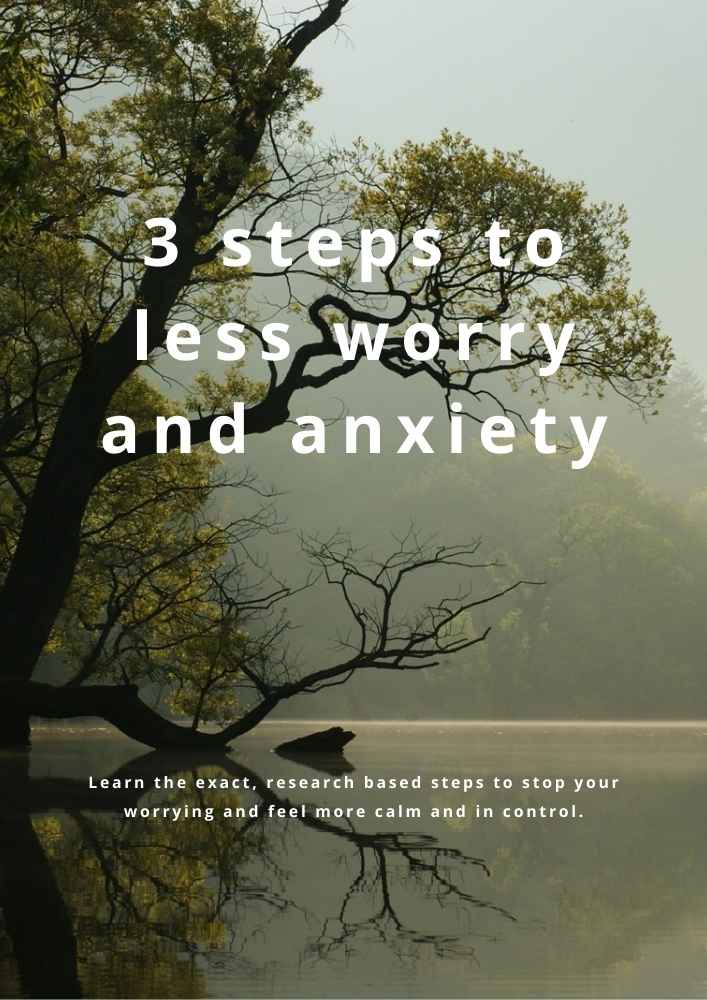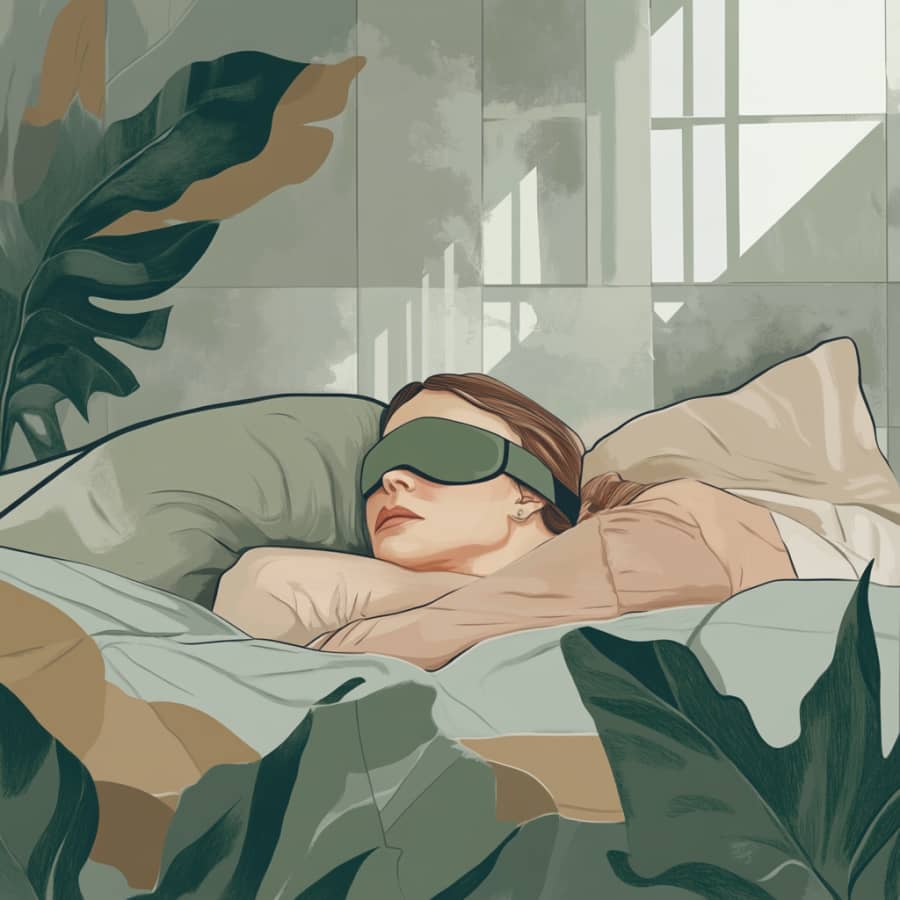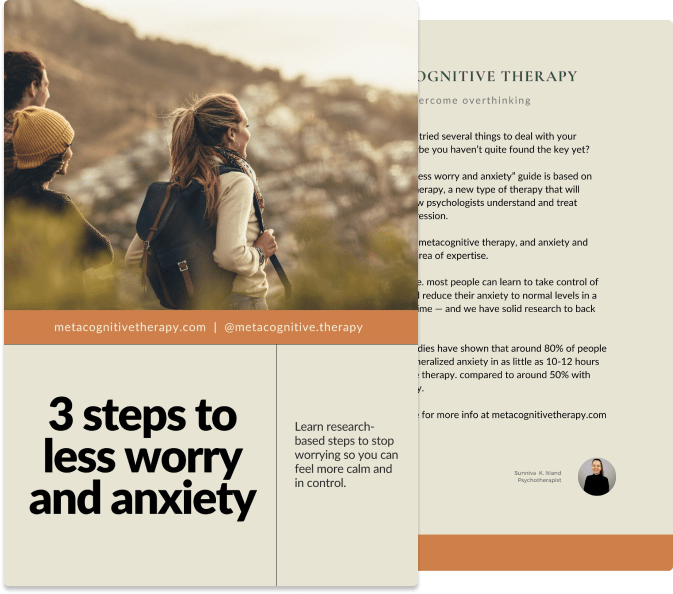Do you get nighttime anxiety? Here’s how to sleep without stress

Download our best tips on reducing anxiety and worrying
Learn three powerful metacognitive therapy steps to stop the worry cycle, reduce anxiety, and feel calmer in everyday life.


Nighttime can be really challenging for people who worry a lot or experience anxiety. The isolation and stillness of the night can create more space for our worries, making it extra hard to sleep. During the day, distractions and activities can keep rumination at bay. But at night, our worries often catch up to us.
Society also puts a lot of pressure on sleeping well and having the “perfect” bedtime routine. And if you’ve had trouble sleeping before, you might feel more stress about the act of going to sleep itself, creating an anxious bedtime cycle that makes you dread nighttime.
Sleep anxiety and its impact
For those with sleep problems, the pressure to sleep can create a lot of anxiety, and the focus on bedtime becomes a stressor that leads to a vicious worry cycle.
When we can’t sleep, a lot of people worry this will negatively impact their mental and physical health, to the point that it creates a self-fulfilling prophecy. Poor sleep doesn’t necessarily cause anxiety, but it can make it harder to manage since when we're tired, we default to habitual behaviours, like worrying.
So how can you stop feeling anxious about bedtime?

Download our best tips on reducing anxiety and worrying
Learn three powerful metacognitive therapy steps to stop the worry cycle, reduce anxiety, and feel calmer in everyday life.
Why typical bedtime strategies might not help
When worries crop up at night, many people try to stop their anxious thoughts either by pushing them away or by trying to solve problems they're worried about. But both of these approaches can be counterproductive. Actively trying to suppress thoughts can keep your mind awake, while problem-solving can lead to even more mental engagement and worry, making it feel impossible drift off.
Even strategies like meditation or “counting sheep” can keep you from sleeping, because they involve an active mental process. Instead, it can be more effective to try the Metacognitive Therapy (MCT) approach of allowing negative thoughts to exist without engaging with them—neither pushing them away nor solving them. This passive approach allows your mind to rest, making it easier to fall asleep.
The problem with strict bedtime protocols
Many people try to solve their sleep problems by following strict routines or avoiding certain activities. They stop exercising at a certain point of the day, eliminate blue light, only eat certain foods and drinks, and create detailed sleep rituals. But these rigid regimens can add to the pressure of bedtime rather than alleviate it.
While certain sleep hygiene practices are helpful, becoming obsessive and restrictive can lead to more anxiety about sleep. Keep in mind that people who sleep well usually don’t have extreme nighttime routines.

Sleep better by breaking the cycle of rumination
Despite all the external “quick fixes” that are available for better sleep, the key to alleviating sleep anxiety for good comes down to how you handle your thoughts. You can break out of the cycle of nighttime rumination by understanding that having a thought and actively thinking about it are two different things.
Negative thoughts may arise when you get into bed, and you might get worry-thoughts about whether you will sleep tonight, but you don’t have to engage with those thoughts. When a thought arises, it can be helpful to practice the MCT method of detached mindfulness, recognizing that this is simply a thought, and that it will pass in it's own time without you having to do anything. This means not trying to solve the thought, not trying to push it away (especially since thought suppression is a strong predictor for poor sleep), and not getting wrapped up in it.
By allowing thoughts to exist without engagement, your mind can relax without actively worrying and ruminating. The goal isn’t to empty your mind, but to stop actively engaging with your thoughts.
We put a lot of pressure on getting enough sleep, and it can feel overwhelming when overthinking and worry are getting in the way. The good news is, MCT encourages a “do less” perspective — a minimalist approach to bedtime — that doesn’t add extra steps or things to worry about.
Try adopting a more accepting attitude towards occasional sleeplessness, recognizing that it's okay to feel tired and that it’s possible to get through the day regardless, to reduce some of that pressure. Sleep, like breathing or blinking, is a natural process that works best when it’s allowed to regulate itself, and trying to control your sleep too much can ultimately make it more difficult. If bedtime stresses you out, try setting a goal of resting instead of a goal of falling asleep.
We hope this helps you enjoy more restful nights. If you’re interested in learning more about what causes anxiety and how to feel better, you can read about it here.



